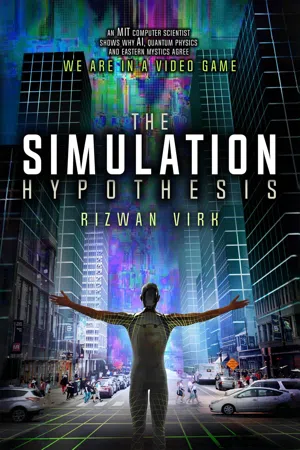
The Simulation Hypothesis
An MIT Computer Scientist Shows Why AI, Quantum Physics and Eastern Mystics All Agree We Are In a Video Game
- English
- ePUB (mobile friendly)
- Available on iOS & Android
The Simulation Hypothesis
An MIT Computer Scientist Shows Why AI, Quantum Physics and Eastern Mystics All Agree We Are In a Video Game
About this book
Written by well-known Silicon Valley entrepreneur and MIT-educated computer scientist Rizwan Virk, The Simulation Hypothesis brings together disparate fields to explore one of the most daring and consequential theories of our time: The Simulation Hypothesis. Whether you are a computer scientist, a fan of science fiction like the Matrix movies, a video game enthusiast, or a spiritual seeker, The Simulation Hypothesis touches on all these areas. The Simulation Hypothesis is the idea that our physical reality, far from being a solid physical universe, is part of an increasingly sophisticated video game-like simulation, consisting of pixels with its own internal clock.In the Simulation Hypothesis, the mysteries of quantum science, the path of artificially intelligent consciousness, the evolution of VR and quantum computers, along with previously taboo subjects like consciousness and karma, are brought together into a cohesive, information-based computer science framework. Leading figures like Elon Musk and Stephen Hawking have advocated the Simulation Hypothesis. For the first time, the Simulation Hypothesis delves into all the angles that make this remarkable theory one of the most important of our time!
Frequently asked questions
- Essential is ideal for learners and professionals who enjoy exploring a wide range of subjects. Access the Essential Library with 800,000+ trusted titles and best-sellers across business, personal growth, and the humanities. Includes unlimited reading time and Standard Read Aloud voice.
- Complete: Perfect for advanced learners and researchers needing full, unrestricted access. Unlock 1.4M+ books across hundreds of subjects, including academic and specialized titles. The Complete Plan also includes advanced features like Premium Read Aloud and Research Assistant.
Please note we cannot support devices running on iOS 13 and Android 7 or earlier. Learn more about using the app.
Information

Putting It All Together
These lines may have their root in quite different parts of human culture, in different times or different cultural environments or different religious traditions; hence, if they actually meet … then one may hope that new and interesting developments will follow.66

Skeptics and Believers: Evidence of Computation
The Categories of Arguments/Experiments
- Evidence of Consciousness. There is a group of scientists and others that believe that consciousness is at the heart of the universe. This includes many physicists—ranging from Max Planck to Amit Goswami and others. Some folks in the camp use this basic idea about the universe as an argument against the simulation hypothesis by stating that Bostrom’s simulation argument cannot be true because it states that we are simulated beings only, as opposed to conscious beings. The objection here is not to the idea of simulation but to the concept of lifeless AI, rather than conscious beings.
- Evidence of Negation. These are either experiments or arguments that purport to prove that we cannot be living in a computer-generated simulation, usually because of some physical properties or by calculating the resources that would be required to generate a simulation like our physical world. These experiments and arguments usually show how a simulation of the universe would require infinite resources—a seeming impossibility—or it would require at least as many atoms as there are in physical reality, so what would be the point?
- Evidence of Conditional Rendering. In this class of experiments, physicists are looking for evidence that the physical universe operates like a computer video game. In a video game, only the items that are directly visible are rendered. This is an important optimization technique used in all 3D video games that saves computing power and resources. The experiments in this category tend to be variations of the delayed-choice double-slit experiment, which we explored in Chapter 6, Parallel Universes, Future Selves, and Video Games. Some of these arguments emphasize that there needs to be an observer. This seems to be implying that if we are in a video game, we need players.
- Evidence of Pixels or Computation. As we explored in Chapter 7, Pixels, Quanta, and the Structure of Space-Time , if we live in a computer-generated reality, then the physical world should leave some clues that a computer is generating our reality. These clues could be in the form of pixels (more on these soon), blurring of pixels, or other “artifacts” of coding techniques that could be embedded into the physical structure of our seemingly physical universe.
A Quick Note about Metaphysical Experiments and Consciousness
Table of contents
- Overview
- How to Build the Matrix: The Computer Science
- How Simulation Explains Our World: The Physics
- How Simulation Explains the Unexplainable: The Mystics
- Putting It All Together
- Notes